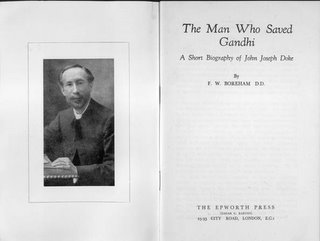 One lovely morning we were sitting together on the veranda, looking away across the golden plains to the purple and sunlit mountains, when I submitted to him a very pertinent question: “Can a man be quite sure,” I asked, “that, in the hour of perplexity, he will be rightly led? Can he feel secure against a false step?” I shall never forget his reply. He sprang from his deck chair and came earnestly towards me. “I am certain of it,” he exclaimed, “if he will but give God time! Remember that as long as you live,” he added, entreatingly. “Give God time!”
One lovely morning we were sitting together on the veranda, looking away across the golden plains to the purple and sunlit mountains, when I submitted to him a very pertinent question: “Can a man be quite sure,” I asked, “that, in the hour of perplexity, he will be rightly led? Can he feel secure against a false step?” I shall never forget his reply. He sprang from his deck chair and came earnestly towards me. “I am certain of it,” he exclaimed, “if he will but give God time! Remember that as long as you live,” he added, entreatingly. “Give God time!”Ten years later‑Mr. Doke having left New Zealand in the interval‑my wife and I found ourselves in the throes of a terrible perplexity. I had received a call to Hobart in Tasmania. It took us completely by surprise: I knew nobody in Tasmania and nobody in Tasmania knew me. The thought of leaving Mosgiel nearly broke my heart: I loved every stick and stone about the place. But I was compelled to recognize that Hobart, being a city, offered opportunities of influence that Mosgiel could never boast.
The call came in 1906. In 1903 the Mosgiel Church had presented us with a delightful trip to the dear Homeland‑a heavy undertaking for so small a congregation. Could I, after accepting such munificence at their hands, think of leaving them? If my call to Hobart had been public property, I could have consulted my officers on the point. But not a soul knew of it, and we thought it best to keep the secret to ourselves until our decision had been taken.
For reasons of their own, the officials at Hobart had asked me to let them have my decision not later than a certain Saturday, three weeks distant, and I had promised to respect their wishes in that matter. As that day drew nearer, the issues narrowed themselves down to one. Did the acceptance of the English trip commit me to a prolonged ministry at Mosgiel?
When that Saturday dawned, we were as far from finality as ever. The post office closed at five o’clock in the afternoon and I was determined, come what might, to hand in my reply by then. In my confusion I recalled for my comfort that memorable conversation on the veranda ten years earlier. Give God time! But I had not much more time to give. That Saturday afternoon, to add to our distress, a visitor arrived. She stayed until half-past four. “Come on,” I then said to my wife, “put on your hat and we'll walk down to the post office. We must send the telegram by five o'clock, whatever happens.”
At five minutes to five we were standing together in the porch of the post office, desperately endeavouring to make up our minds. We were giving God time: would the guidance come? At three minutes to five, Gavin, the church secretary, rode up on a bicycle. He was obviously agitated.
“What do you think I heard in the city this morning?” he asked eagerly. I assured him that I could form no idea.
“Well,” he replied, his news positively sizzling on his tongue, “I heard that you have been called to Hobart!”
“It's true enough, Gavin,” I answered, “but how can we consider such an invitation after your goodness in giving us a trip to England?”
“A trip to England!” he almost shouted. “Man alive, didn't you earn your trip to England before you went? Why, you're very nearly due for another!”
I begged him to excuse me a moment. The clerk at the counter was preparing to close the office. I handed in my telegram and rejoined Gavin, who insisted on taking us home to tea. At his house I wrote out my resignation, asking him to call the officers together at ten o'clock next morning. And although the emotional strain under which I found myself choked my utterance and compelled me to leave to Gavin the task of explanation, I felt, beyond the shadow of doubt, that the promised guidance had not failed me and that Mr. Doke's assurance had been amply vindicated.
F W Boreham


